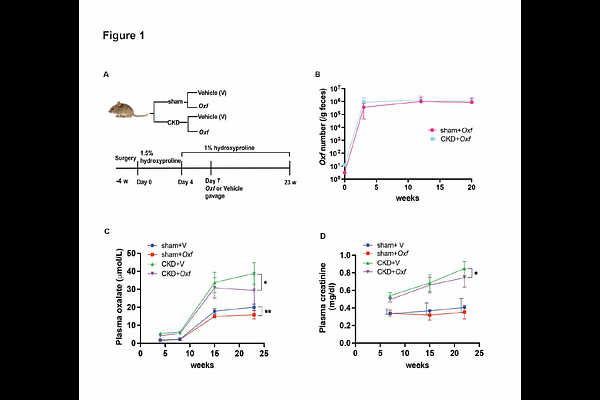Colonization with Oxalobacter formigenes slows the progression of CKD and reduces cardiac remodeling in CKD

Colonization with Oxalobacter formigenes slows the progression of CKD and reduces cardiac remodeling in CKD
Xiong, X.; Ho, M.; Jaber, K.; Mishra, R.; Charytan, A.; Zaidan, N.; Schlamp, F.; Fishman, G. I.; Nazzal, L.
AbstractAccumulation of oxalate in patients with chronic kidney disease (CKD) is associated with CKD progression and increased risk of cardiac death. Whether reducing plasma or urine oxalate slows CKD progression and prevents cardiovascular complications remains unexplored. We colonized the intestines of control and CKD mice with Oxalobacter formigenes (Oxf), an oxalate-degrading microorganism. The mice were fed with the oxalate precursor hydroxyproline for 23 weeks at which time we assessed pathological changes in the kidney and heart. We demonstrate that Oxf reduces plasma oxalate (pOx) and creatinine levels, mitigates inflammation and fibrosis in the kidney, and reduces pathologic cardiac remodeling in the hearts of CKD mice. RNA-seq analysis of ventricular tissue of CKD mice reveals dysregulated expression of metabolic pathways while Oxf colonization reverses these changes. These findings demonstrate that oxalate accumulation plays a role not only in CKD progression but also in associated cardiovascular complications and suggest that strategies to reduce plasma oxalate levels may have therapeutic benefit.